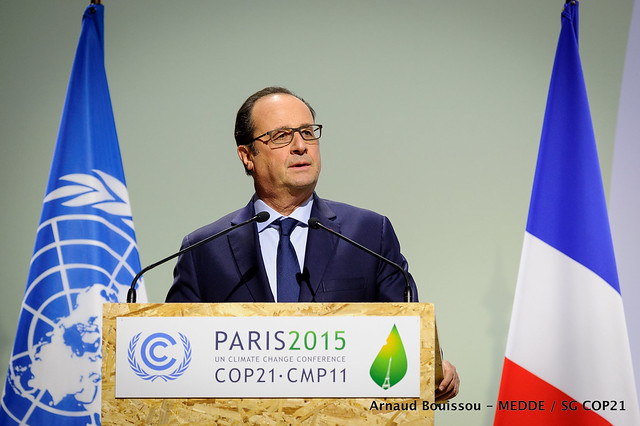11月30日,聯合國為期兩週的氣候峰會(COP21)以一系列的世界領袖談話、數十億的氣候資金承諾和氣候創新揭開序幕。
法國總統歐蘭德致詞開幕式。圖片來源:COP PARIS。
聯合國秘書長:巴黎將是轉捩點
聯合國秘書長潘基文向全世界143國家與政府領袖和數千位代表開場致詞時,呼籲談判者選擇妥協與共識,「積極的氣候行動是在場每個國家的利益所在。邊緣政策的時代已經過去。」潘基文多年來往來全球,努力不懈地催生具有包容性和法律約束力的減碳協議。
「讓我們一起建立有明確規則讓所有國家共同遵守的氣候制度。巴黎必須是個轉捩點。我們必須讓世界知道,我們正往低碳、具氣候韌性的未來前進,沒有回頭路。」潘基文表示。
「超過180個國家交出了自主減碳計畫,涵蓋近全世界100%的碳排放。這是好的開始,但要控制暖化2℃以內,我們必須更加努力、加快腳步。科學已經清楚證明,就算是2℃也將威脅糧食、水資源安全、經濟穩定和國際和平。因此,我們需要全球性、有意義的巴黎協議。」
法國總統歐蘭德表示,如果COP21能訂定出控制暖化2℃以內,甚至1.5℃的可行作法,就能成功。他強調團結合作,「如此所有國家都必須信守承諾」,並表示希望任何協議都能動員所有社會和產業一齊行動。
COP21主席、法國外長Laurent Fabius列出巴黎峰會成功的三個條件,分別是動員國家政府領袖、非政府實體的團結和承諾,以及達成「具有差異性、公平性、動態的、平衡的、具有法律約束力、全球性且積極的氣候協議,能確保暖化2℃以內。」
歐巴馬:美國接受承擔氣候責任
在各國領袖每人三分鐘的談話時間中,歐巴馬表示,「美國不只瞭解自己製造氣候問題的角色,也接受付出的責任。...我們對人類如何擾亂氣候的瞭解越來越深入。史上最高溫的15年有14年發生在2000年以後——2015更是史上最熱的一年。沒有哪個國家,不管大小貧富,得以倖免於此。」
「今年夏天,我親眼看到阿拉斯加的海水吞噬村莊、侵蝕海岸;永凍土與苔原起火燃燒;冰川以前所未有的速度融化。如果氣候繼續快速改變,這可能就是我們的未來,我們孩子們的命運。國土被淹沒、城市荒廢、寸草不生。政治動盪引發新衝突,越來越多絕望的人們往其他國家尋求庇護。不管是經濟強權或是弱勢都將失去立足之地。但我們此時此刻可以改變,也只剩這個時候了。上工吧。」
美國和中國是全世界最大已開發和開發中國家,溫室氣體排放量共佔全球總量40%。
習近平:氣候協議應具執行力
領導全球最大排碳國的中國國家主席習近平表示,巴黎氣候協議應遵循UNFCCC的原則,聚焦於完整的執行和「形成能促進共同努力的制度安排。」習近平強調,巴黎峰會必須「...尊重各國經濟結構和能力,不應否定開發中國家改善生活水平和發展經濟的合理需求。」
德國總理梅克爾指出,目前的各國自主減碳承諾(Intended Nationally Determined Contributions,INDCs)是自願性的,遠不足以達到控制暖化2℃以內,而且2℃的目標對小島國來說根本不夠。梅克爾呼籲從2020年開始每五年強制審核一次,確保可靠度和目標的提升。
此外,梅克爾也強調經濟減碳和所有產業轉型的重要,並呼籲已開發國家為過去的排碳負起責任,領導資助氣候科技的進化。
俄國總統普丁表示,俄國不但達成京都議定書的要求,甚至做得更多。「我們不只把碳排維持在1990年水準,甚至更低,同時也讓GDP成長一倍。也就是說,發展經濟和保護環境是可以並存的。」
「接下來,俄國將減碳至1990年的70%。」普丁承諾。
The United Nations’ two-week climate conference opened here today with a bouquet of speeches from world leaders, billions in funding pledges, and innovative ideas to help humanity battle climate change.
Opening the 21st Conference of the Parties (COP 21) to the United Nations Framework Convention on Climate Change, UN Secretary-General Ban Ki-moon addressed 143 heads of state and government and thousands of delegates assembled at the Paris–Le Bourget Airport, seven miles outside of Paris.
“I urge you to instruct your negotiators to choose the path of compromise and consensus. Bold climate action is in the national interest of every single country represented at this conference,” declared Ban. “The time for brinksmanship is over.”
“Let us build a durable climate regime with clear rules of the road that all countries can agree to follow. Paris must mark a turning point. We need the world to know that we are headed to a low-emissions, climate-resilient future, and that there is no going back,” said the UN leader, who has criss-crossed the globe tirelessly for years to bring about an all-inclusive, legally-binding agreement to limit greenhouse gas emissions.
“The national climate plans submitted by more than 180 countries cover close to 100 percent of global emissions,” said Ban. “This is a good start. But we need to go much farther and much faster if we are to limit global temperature rise to below 2 degrees Celsius.”
“The science is clear. Even a 2-degree rise will have serious consequences for food and water security, economic stability and international peace,” stressed Ban. “That is why we need a universal, meaningful agreement here in Paris.”
France’s President François Hollande said COP21 will be a success if the outcome agreement determines a credible path to limit temperature rise below 2°C, or 1.5°C if possible. He stressed solidarity “so that no state can abstain from its commitments” expressed the hope that any agreement would mobilize all societies and sectors to act.
COP 21 President and French Foreign Minister Laurent Fabius outlined three conditions for success in Paris: mobilizing heads of state and government; bringing together and obtaining commitments from non-governmental entities; and reaching “a universal, ambitious climate agreement that is differentiated, fair, lasting, dynamic, balanced, legally-binding and ensures staying below 2°C.”
The world leaders then each stepped to the podium for their allotted three minutes. President Barack Obama said, “I’ve come here personally, as the leader of the world’s largest economy and the second-largest emitter, to say that the United States of America not only recognizes our role in creating this problem, we embrace our responsibility to do something about it.”
“Our understanding of the ways human beings disrupt the climate advances by the day. Fourteen of the 15 warmest years on record have occurred since the year 2000 – and 2015 is on pace to be the warmest year of all. No nation – large or small, wealthy or poor – is immune to what this means,” he said.
“This summer,” Obama shared, “I saw the effects of climate change firsthand in our northernmost state, Alaska, where the sea is already swallowing villages and eroding shorelines; where permafrost thaws and the tundra burns; where glaciers are melting at a pace unprecedented in modern times.”
“And it was a preview of one possible future,” he said, “a glimpse of our children’s fate if the climate keeps changing faster than our efforts to address it. Submerged countries. Abandoned cities. Fields that no longer grow. Political disruptions that trigger new conflict, and even more floods of desperate peoples seeking the sanctuary of nations not their own.”
That future is not one of strong economies, nor is it one where fragile states can find their footing. That future is one that we have the power to change. Right here. Right now. But only if we rise to this moment,” Obama said. “Let’s get to work.”
The United States and China, the world’s largest developed and developing countries, in total account for about 40 percent of all greenhouse gas emissions.
Chinese President Xi Jinping, who heads the largest greenhouse gas emitting nation, said that the Paris agreement should follow the principles of the UNFCCC, focus on its full implementation and “create institutional arrangements that compel concerted efforts.”
President Xi maintained that the Paris agreement must, “…respect differences in countries’ economic structures and capacities, and not deny the legitimate needs of developing countries to improve living standards and develop economically.”
German Chancellor Angela Merkel told her fellow leaders that the current Intended Nationally Determined Contributions (INDCs), which Secretary Ban called “national climate plans” are voluntary and thus far “not ambitious enough to attain the 2°C temperature goal, a goal insufficient for small island nations.”
Merkel called for a binding review mechanism with a five-year cycle to begin in 2020 to ensure credibility and increased ambition.
She also stressed decarbonization of economies and the “profound transformation of all industry sectors.”
She called on developed countries, “in recognition of their responsibility for past emissions,” to take the lead in funding technology “advancement.”
President Vladimir Putin said that Russia has not only met the requirements of the Kyoto Protocol, but has done even more. “We not only maintained the 1990 emission levels, we actually reduced them. At the same time,” he said, “we nearly doubled GDP during this period. In other words, it is possible to develop the economy while preserving the environment.
“And at the next stage, Russia will reduce emissions to 70 percent of 1990 levels, pledged Putin.
※ 全文及圖片詳見:ENS









